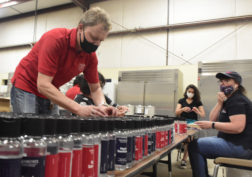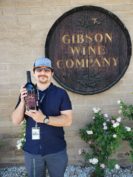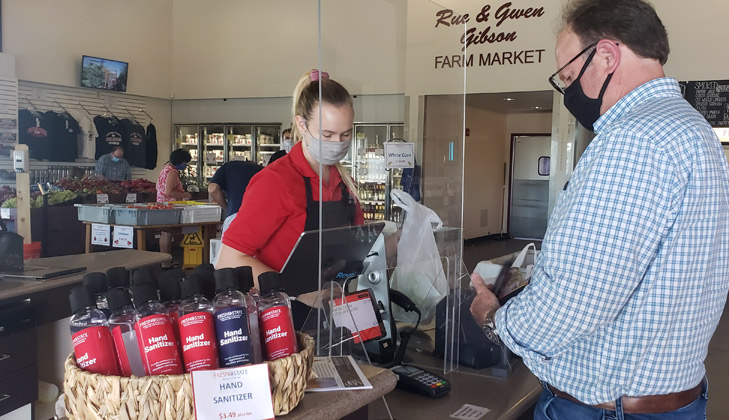
Dr. Stephan Sommer and students produce the first-ever batch of Bulldog hand sanitizer that is now being sold at the Gibson Farm Market.
When the Fresno State Viticulture and Enology Research Center was searching for its new director two years ago, it reached all the way to North Carolina to attract Dr. Stephan Sommer, who had an international-caliber resume steeped in microbiology and wine science.
Now, shoppers at the Gibson Farm Market are also benefiting from his expertise thanks to a new hand sanitizer made under his direction with the help of research students and faculty member Dr. Sonet Van Zyl.
The first batch of four-ounce hand sanitizer bottles was delivered to the Gibson Farm Market this week and priced at $3.49 each.
Staff and students from the Jordan College of Agricultural Sciences and Technology helped label all 2,200 bottles from the 74-gallon batch, and the remainder will be used on campus by the Jordan College, Ag One Foundation and Institute for Food and Agriculture.
Sommer’s experience with the process goes back 20 years ago to when he worked in a microbiology quality control lab for a large juice producer. Since sanitation is key in any food processing industry, large companies often make their own sanitizer since they have access to the raw materials in less expensive, bulk quantities.
He has seen universities make the product as well, and now the beverage industry is following suit.
“A lot of wineries, distilleries and breweries are helping meet the increased demand for hand sanitizer because of the COVID-19 pandemic,” Sommer said. “If you have the right equipment, training and safety protocol, it’s fairly straightforward, but not something you should ever do at home. High-proof ethanol can be very dangerous to work with and very flammable. The alcohol we used is denatured, which means it was strictly produced for non-consumption purposes and is strictly regulated by the industry.”
Sommer used a recipe from the World Health Organization. Like all good cooks do, he deviated slightly and substituted aloe vera gel to make the solution more skin friendly. He also opted not to use hydrogen peroxide, which is not necessary for common hand use.
The current recipe uses a 70% ethanol alcohol concentration that was sourced from the Gibson Wine Company in Sanger. The original concentration started as 95% denatured ethanol that was distilled from grapes, then was diluted with glycerin and aloe vera that is 100% plant-based.
After the ingredients arrived, the mixing process started in the morning and involved slowly mixing the ingredients in purified water. Bottling and labeling by a nine-person team immediately followed and was finished in five hours.
The lead-up process took much longer. Locating ingredients, bottles, labels and getting approval stretched out over several weeks, especially since some supply chains faced shortages.
The project idea initially came from Ag One Foundation executive director Alcidia Freitas Gomes, who was looking for a thank-you gift for alumni and industry support events.
Sommer suggested the campus research center as an option. The native of southwestern Germany had heard earlier in the year how European wineries had created similar batches before the pandemic shifted to the United States.
Gomes added extra help by finding a local vendor, Gibson Wine Company, to supply the denatured alcohol.
The Sanger co-operative, which started in 1939, has 23 area grape growers and produces about 7 million gallons of wine annually. Among its wide selection, five wines have won awards this year, including its gold-medal Ruby Port.

Dominic Bedrossian, a 2017 Fresno State graduate, is the lab manager at Gibson Wine Company, which supplied products to create the hand sanitizer.
The same winery also hired Fresno State alumnus Dominic Bedrossian, a 2017 enology graduate, as a lab manager this past spring to tap his experience in the winemaking process.
“I hadn’t seen any local wineries making denatured alcohol until the pandemic started, but it attracted a lot of business,” Bedrossian said. “From a sustainability standpoint, it also makes sense because we can use grapes that might not be wine quality and still make denatured alcohol with them, which isn’t dependent on those same qualities.”
Bedrossian credits the Viticulture and Enology Department faculty and campus winery experiences for solidifying his career path, which included area winemaking internships at The Wine Group and O’Neill Vintners and Distillers.
“I didn’t know much about wine until my first enology class, which was a sensory lab with Ken Fugelsang (winemaster),” Bedrossian said. “The classes about chemistry with former faculty Hend Letaief and microbiology with William Whalen (lecturer) were really important because I learned how to analyze and address wine issues and interpret lab results. Most people don’t get that kind of experience until an actual internship, but Fresno State is well known for giving hands-on opportunities while you’re a student.”
The biggest satisfaction he gets today comes when he steps out of the lab and into the tasting room.
“It’s a one-of-a-kind experience getting to see people smile,” Bedrossian said. “Making wine is such a long and specialized journey, so you take extra pride in their reaction. We don’t get quite the same reaction with the hand sanitizer, but it’s a new and important way that we can serve others and our communities.”
More information about the campus viticulture and enology department and research center is available online at https://www.fresnostate.edu/jcast/ve/.





